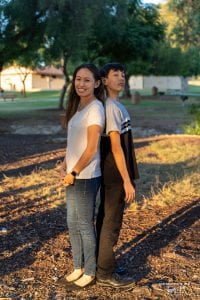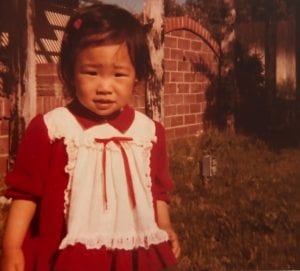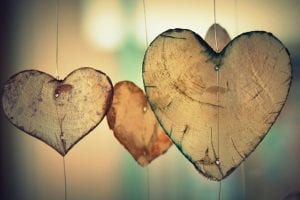When I was in elementary school, I always wanted to be the class representative, but I don’t remember ever being chosen for student council.
I thought that if I continued working hard at my studies, helping my classmates, and helping my teachers, my peers and adults around me would see my “leadership potential.” I worked as hard as I could to be seen as a leader.
At the 6th grade graduation ceremony, there was one student who would be recommended from our school to be the delegate to the 7th grade Associated Student Body. I was so hopeful that it would be me. I really wanted to start off junior high contributing to my school and knowing people, and what better way than a summer where I would get to work with other leaders?! (Did I mention I was a little nerdy?) I had represented my school in various district competitions as an elementary school student (from spelling bee to Math Counts) and I had been one of the first students in my elementary school to be placed in the highest level math AND English classes.
I waited with baited breath for the student leadership award to be announced.
It wasn’t me.
It was Amy G, the elementary school student body president.
Looking back on this moment now, this probably should have been a given. Student body leaders in elementary school are destined to be student body leaders in middle school and high school…and maybe in life.
Throughout middle school and high school, I tried to run for or show interest in leadership in a variety of ways.
But I was never elected, never chosen.
I excelled academically. I got good grades, tons of academic awards, even scholarships. I was even voted most likely to succeed.
But I wasn’t seen as a leader.
Okay, so grown up me sees model minority stereotype & bamboo ceiling written all over all of this, but little (or at least younger) me didn’t know any of that.
Little me just thought that no one would ever think that I was a leader.
Little me thought that I would never be able to contribute the way I wanted to.
Big me thinks this “not a leader” thing is somewhat hilarious since most of my adult/professional life has been dedicated to servant leadership and now, there are some days where I wish people would recognize my leadership capacity a little less (okay, not really, actually, I just need to learn to set better boundaries). Something shifted somewhere along the line. Maybe it was being around others who, in small and large ways, began to see me. Maybe it was finding and developing my passion. Maybe it was finding and discovering more about my identity. But something shifted. Nowadays, I feel seen for who I’ve always deep down known I was. I feel recognized.
(There are also some days where big me still feels like I’ll never be able to contribute in the ways I want to, but for different reasons. That is less hilarious, but I digress.)
Anyways, fast forward 25+ years…
Last week, my 14 year old got an e-mail at his school account. Someone had nominated him for a youth leadership position, a group of youth who would do community work and speak about the impact of COVID on various communities.
When he showed me the e-mail, he said, “This seems really cool, but I’m not sure that I could do this. I don’t really like to speak to people I don’t know. And this seems like you’d have to be cool and have knowledge and be able to tell people what you believe.”
Trying not to pressure him, I responded, “Well, I think you’re cool, and I think you’re well spoken, and you have a lot of knowledge.”
He replied, “You’re my mom. You have to think I’m cool, and I’m not cool, and I can’t speak to other people, and I have knowledge, but I get nervous when I’m trying to explain it to people I don’t know.”
So then, I said, “Well, you can always apply and find out more about the commitment and then if you get chosen, and you don’t feel like you want to do it or you can, you can say no.”
He looked at me, and said, “You’re smart. I didn’t even think about that. Okay, well then, I’ll try.”
He began the application and on the first question got stuck, telling me he didn’t really have any experiences related to COVID. In talking, he felt that because we have relative privilege compared to so many others, he didn’t really see his experience as valuable or contributing. We talked through it. He wrote some things, a lot of things. Then he finished the application on his own and turned it in. At multiple times in the process, he expressed his own self-doubt as to what he could bring and why someone would nominate him.
He doesn’t see himself as a leader, at least not that he would admit to me, but he does know that he’s someone that has always wanted to contribute to something greater than himself.
I always have seen him as a leader, but perhaps, I’m his mom so I have to think he’s a leader (I don’t actually have to think that, but I do actually believe that). I have also always wanted him to have opportunities to contribute.
More importantly, in this moment, some other anonymous adult in his life, related to school (because no one else would have that address for him), sees him as a leader too, or a potential one, at least.
Mama me couldn’t be prouder.
Someone saw my son the way I’ve always seen him.
In the contrast of how I wished to be seen as a child and adolescent, and how I’ve seen my son recognized, in ways that surprise him, I feel healing and hope.
Every child deserves to be seen for their potential.
As a mother and an educator, I’ve realized this week that one of our greatest roles is standing for the greatness that people may or may not recognize for themselves, within themselves. Our task is to see that greatness and to recognize it, to nurture it and to grow it, to support it and to be with it, in moments of doubt.
Greatness is a gift.
It’s a gift we all have.
If it is unseen and unrecognized, it can take much longer for that greatness to manifest, if it is able to come to the surface at all.
But when it is seen and recognized, particularly by others as young people, it allows us to be our best selves and make our most authentic contribution to the world around us.
I had to do a lot of work to embrace my own greatness. My son will also have a journey towards embracing his greatness.
It did not look like I thought it would. I am imagining that his greatness won’t look exactly the way he pictured it either.
My hope is for more joy in his journey than mine, and that we will learn to see ourselves and recognize for ourselves that which those we love see around us each day.



